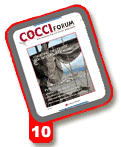COCCI Views
It's all about food safety - Stephen P. Collins Vice President, Worldwide Poultry Schering-Plough Animal Health Corporation
 Stephen P. Collins Vice President, Worldwide Poultry Schering-Plough Animal Health |
When looking over the articles
for this issue of CocciForum, I
was moved by Dr. Corrado
Longoni's main reason for wanting
to remove drugs from the
poultry feeds used by his
employer, Martini Alimentare, a
major producer in Italy.
"I have two babies at home," he says in the article beginning
on page 8. "When I go down to our company slaughterhouse
to buy chicken for my family, I do it with confidence
because I know our product is safe and free of drug
residues. Food safety has to be our first priority "for us,
for our customers and for the image of the poultry industry."
In our special report about the global
symposium we sponsored for nutritionists working to
manage disease through better intestinal health, I was struck
by Dr. Joaquim Brufau's list of the top three concerns in the
European poultry industry: food safety, food safety and food
safety.
More drug bans coming
Later that same day, I reviewed a paper that my colleague, Dr. Fabio Paganini, prepared for the Seventeenth European Symposium on the Quality of Poultry Meat in the Netherlands this May. He noted the growing concerns from consumers and the medical community about antibiotic resistance in animals being passed along to humans. Even though this relationship has been a controversial issue, the use in animal feed in the European Union will be prohibited as of January 1, 2006. How long will it be before the US and other major markets do the same "if only to meet demands of export markets?
Then there are the ionophores, another type of feed
antibiotic commonly used in poultry and livestock to manage
coccidiosis. Paganini writes that the use of these in-feed
anticoccidials in livestock does not appear to be related to
the development of resistance in humans.
"However," he adds, "their toxicity to non-target species
and the potential contamination of meat, animal feed and
the environment with residues have made a growing number
of poultry producers discontinue their use in favor of
drug-free alternatives such as vaccines.
"When vaccination is coupled with good management,
particularly high quality nutrition, it greatly reduces or
eliminates the need for drugs used to control coccidiosis
as well as other conditions in birds. At the same time, it
allows producers to be as cost-competitive as when using
anticoccidials."
There are alternatives
Schering-Plough Animal Health saw this trend coming in
the 1990s and recognized the need for alternatives to
coccidiosis management. That certainly gave us reason to
speed development of our two lines of coccidiosis vaccines,
Coccivac and Paracox, but we also saw an opportunity
to help the poultry industry find drug-free alternatives
without compromising performance, efficiency and
profitability.
In time we recognized that there was more to managing
coccidiosis in drug-free birds than swapping a medication
for a vaccine. To make this work effectively, poultry companies
also need to rethink their nutrition programs and
focus on better intestinal health.
We are happy that we can share our expertise in this
area "whether it's through an article in CocciForum, a visit
to a customer or by hosting major seminars, such as the
ones we held recently in Madeira (page6) and Atlanta at the
International Poultry Expo.
More importantly, we are grateful for the many independent experts who have been working closely with us to develop the IDEA concept for better intestinal health. You can count on us to bring you more ideas and products for better intestinal health in the future.







